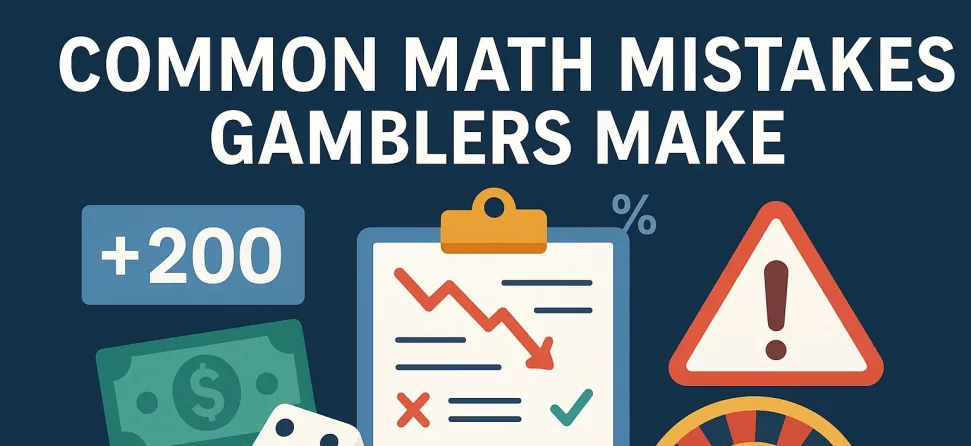Common Math Mistakes Bettors Make

Whether you’re betting on sports or playing online casino games, everything comes down to math. Every spin, hand, and wager is driven by numbers. The house doesn’t win because it’s lucky, it wins because it understands the math better than you do.
Most players never think about probabilities, payout percentages, or the house edge. They just play by feel and hope to get hot. That’s how casinos and sportsbooks stay rich. Once you learn how the numbers really work, you’ll start to see where most gamblers go wrong — and how to stop giving the house free money.
🎲 Misunderstanding Probabilities
One of the biggest mistakes gamblers make is not understanding what odds mean. In sports betting, +200 odds mean there’s about a 33% chance of winning. If you think your pick has a better chance than that, it’s a smart bet. If not, you’re throwing money away.
In casino gaming, it’s the same thing. Every outcome in blackjack, roulette, or slots has a mathematical likelihood. You might think a “lucky streak” is coming, but probability doesn’t care about momentum. Every spin or deal is independent. Ignoring that is the fastest way to lose money.
🏠 Ignoring the House Edge
The house edge is how casinos make money. Every game has a built-in advantage for the house. It might be small, but it adds up fast. Blackjack might only have a 0.5% edge with perfect play. Slots can go above 10%. Most people never check.
Here’s how the house edge breaks down for some of the most popular games at online casinos:
| Game | Average House Edge | Smart Player Edge Tip |
|---|---|---|
| Blackjack | 0.5% (with basic strategy) | Always play 3:2 tables and avoid side bets. |
| Baccarat | 1.1% (banker bet) | Stick to banker bets; ignore ties. |
| Roulette | 2.7% (European), 5.3% (American) | Choose European roulette only. |
| Craps | 1.4% | Focus on Pass/Don’t Pass and odds bets. |
| Slots | 4–10% | Look for games with 96%+ RTP. |
| Sports Betting | ~4.5% (via vig) | Shop for lines to cut the juice. |
In sports betting, the house edge comes through the vig. When both sides of a game are listed at -110, that juice guarantees the sportsbook profits even if the bets split evenly. You’re paying a silent tax every time you wager. The smaller that edge, the better your long-term results.
💰 Overvaluing Big Payouts
Gamblers love longshots. That’s why parlays, progressive jackpots, and exotic prop bets exist. The problem? The payouts look good, but the math behind them doesn’t.
A 5-leg parlay or a 50-line slot might offer a huge return, but the true odds of hitting it are worse than they look. That’s why those bets exist in the first place — they’re built to attract dreamers. If you’re trying to make money, not chase headlines, focus on single bets and high-return games instead of lottery-style plays.
🍀 Confusing Luck with Expected Value
Luck can make you money today. Math decides whether you’ll make money forever. Expected value (EV) measures whether a bet is profitable over time. You can lose a good bet and win a bad one, but if you keep making +EV plays, the long-term math works in your favor.
Casino players see the same concept in return-to-player (RTP). A game with 97% RTP means it pays back $97 for every $100 wagered over time. That doesn’t mean you’ll win $97 every time you play. It just means the math catches up eventually. Both EV and RTP tell you the same thing: good gambling is about the numbers, not the noise.
📉 Mismanaging Variance
Variance is the streaky part of gambling. It’s why you can go cold for days or hit a massive heater. Most players don’t understand that short-term swings are normal. When they lose a few hands or bets, they panic and double down — which is exactly what the house wants.
If you’re playing the right games or making sharp bets, variance will even out over time. But you have to stick with the plan. The math only works if you give it enough time to do its job.
💵 Ignoring Bankroll Math
Bankroll management isn’t exciting, but it’s the difference between lasting a season or busting in a week. Too many players bet based on confidence or emotion. One “can’t-miss” play shouldn’t cost half your balance.
Set a unit size – usually 1–3% of your total bankroll – and stick with it. Whether you’re betting sports or spinning slots, you can’t control outcomes, but you can control how much you risk. The math behind bankroll management keeps you in the game long enough for your edge to matter.
📊 Forgetting About Payout Percentages
Casino players often skip over payout tables, which is like skipping fine print on a contract. Different versions of the same game can have completely different odds. A blackjack table paying 3:2 is far better than one paying 6:5. A slot with 96% RTP is much friendlier than one with 91%.
Sports bettors have an equivalent in line shopping. Getting +105 instead of +100 might seem small, but it adds up over hundreds of bets. Over time, those few cents separate winning players from break-even ones. Always find the best price for every wager. The math demands it.
🔥 Chasing Losses
This is the most emotional math mistake there is. You lose a few bets and think you’re “due.” You double your next wager to get it back. Before you know it, one cold streak wipes out weeks of progress.
The math behind chasing is brutal. You’re increasing your risk while your probability of winning stays the same. When you start making decisions based on emotion, you’re no longer gambling — you’re reacting. That’s how the house wins almost every time.
♻️ Misreading Streaks
Hot and cold streaks fool almost everyone. You win five in a row and think you’ve cracked the code. You lose five in a row and think you’re cursed. In both cases, variance is just doing its thing.
Good gamblers don’t change strategy mid-streak. They trust the math and stick to the process. If you have an edge – whether it’s picking sharp lines or playing high-RTP games – the streaks balance out over time. The worst move you can make is overreacting to randomness.
📋 Not Tracking Results
You can’t manage what you don’t measure. Most players don’t track wins, losses, or ROI. They just assume they’re ahead or close to even. The math usually says otherwise.
Tracking every wager keeps you honest. You’ll see patterns in your mistakes, spot which games drain your balance, and identify where your real edge lies. The numbers don’t lie — you just have to look at them.
🧮 How to Fix These Math Mistakes
Fixing bad gambling math starts with slowing down. Every bad habit on that list comes from guessing instead of calculating. You don’t need fancy tools, just discipline, awareness, and a willingness to treat gambling like a numbers game instead of a gut game.
Start by tracking every bet, spin, or hand. Write down what you risked, what the payout was, and whether you beat the odds. That one habit alone will expose patterns in how you’re losing. Next, learn the real numbers behind what you’re playing. Check a slot’s RTP, look up the true odds of your roulette bets, and calculate implied probabilities for your sports wagers. Knowledge always beats superstition.
| Mistake | Why It Hurts | Smart Fix |
|---|---|---|
| Ignoring the Vig / House Edge | You pay a hidden tax on every bet. | Bet games with smaller edges and shop for better odds. |
| Overvaluing Big Payouts | True odds are worse than the posted payout. | Stick to single bets and high-RTP games. |
| Chasing Losses | Emotional bets kill bankrolls. | Use flat unit sizes and reset after losses. |
| Mismanaging Bankroll | Going too big too often leads to busts. | Risk 1–3% per wager, no exceptions. |
| Misunderstanding Probabilities | Leads to false confidence and bad picks. | Learn implied odds and payout math. |
Finally, manage your bankroll like a business. Bet the same unit size every time, stop chasing losses, and focus only on wagers or games where the math gives you a chance. Once you understand which behaviors drain your balance and which ones protect it, the numbers start working for you instead of against you.
Final Thoughts
Winning at gambling isn’t about luck. It’s about making smart mathematical choices over and over again. The casinos and sportsbooks are built to take advantage of emotion, overconfidence, and bad math. Once you start thinking in percentages and probabilities, you stop being an easy target.
Every bet, spin, or hand has a number behind it. Learn what those numbers mean, and you’ll start making better decisions automatically. Whether you’re betting sports or playing online casino games, the players who understand the math are always the ones who last the longest.




